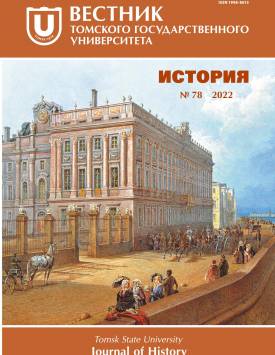Jewish Life Metamorphosis in Buryat-Mongolian ASSR: from Rootless Cosmopolitans to Panmongolists
Aim of the article is to investigate authority’s attitude in connection with the Jews on the territory of contemporary Buryatia in 1920-1950s according to the state position in national issue, being depended from the status and ideology of local administrative - territorial entitles. The source base of investigation happened to be VChK’s instructions about Zionist threat and papers of the State Archive of the Republic of Buryatia, describing peculiarities of national-cultural policy in the Buryat-Mongolian ASSR in 1940-1950-s. The policy in reference to the Jews, always having being considered to be a turbulent nation, though followed the state one was somehow different in Buryat-Mongolia. Accusations in adherence to Zionism and cosmopolitism, being the core of the Soviet power’s Jewish policy in 1920s and 1940-1950s were supplemented in the Republic with absurd suspicions in allegiance to Panmongolism. Participation of some Jewish intellectuals in translation of the Buryat «Geser» Epic was treated as the formal reason for such accusations. In the course of investigation the authors came to following conclusions: distortions in national policy in Buryat-Mongolia, when the aspiration for developing national language and culture aroused suspicion in bourgeois nationalism, those being duplicated around the country. Declaring the development of the national cultures as the core of national policy, the state did not define the strict frames behind which development came to the end and nationalist propaganda was launched; according to the tradition, the Jews were considered to be an unreliable nation, though they did not have any anti-govemment plans. Their devotion to Zionism could be explained only with the idea of national revival. The campaign against rootless cosmopolitans was in fact the offensive to creative intelligentsia’s free thinking; in the Buryat-Mongolian ASSR representatives of the Jewish literary community, aimed at national staff training, became the victims of the vector change in relation to Panmongolism. In 1940s, instead of the means of the unique Mongolian world space construction, it turned to spy-subversive ideology, threatening the national security and Buryat «Geser» Epic from the outstanding oral folk masterpiece in a moment changed to the manifestation of feudal-religious archaic survival; accusation of the Jews to the belonging to Panmongolism exactly embedded into the policy of the building enemy ideologies from the natural peoples’ desire to have their own state. Panmongolism was designed as the base of future national-state formation in the Mongolian world, as well as Zionism was the ideological cornerstone of the Jewish state development. The authors declare no conflicts of interests. The authors declare no conflicts of interests.
Keywords
Jews, Panmongolism, «Geser» Epic, cosmopolitism, Buryat-MongoliaAuthors
| Name | Organization | |
| Kuras Leonid V. | Institute for Mongolian, Buddhist and Tibetan Studies of the Siberian Branch of the Russian Academy of Sciences | kuraslv@yandex.ru |
| Kalinina Lilia V. | Institute for Mongolian, Buddhist and Tibetan Studies of the Siberian Branch of the Russian Academy of Sciences | kalminal@gmail.com |
References

Jewish Life Metamorphosis in Buryat-Mongolian ASSR: from Rootless Cosmopolitans to Panmongolists | Tomsk State University Journal of History. 2022. № 78. DOI: 10.17223/19988613/78/5
